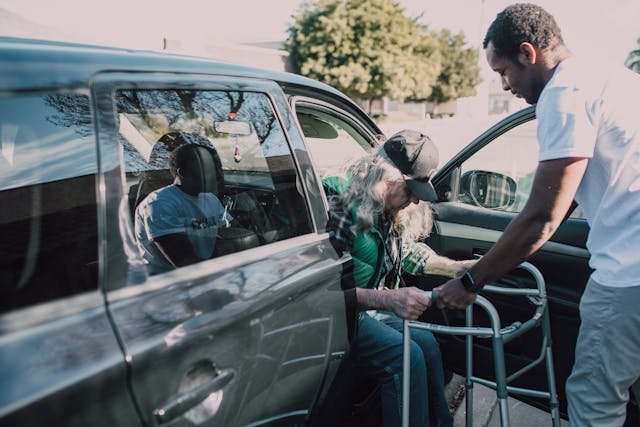Life doesn’t stop after getting a prosthetic limb — it simply begins in a new way. For many seniors, adjusting to this change is not just about learning to walk, grasp, or move again. It’s also about feeling comfortable and confident in social spaces — at family gatherings, community events, or while traveling.
The physical part of adapting to a prosthesis can be mastered with time and practice. But regaining social confidence sometimes takes a little longer. Seniors may feel uncertain about how others will react, or worry about being treated differently. Yet, with the right mindset, preparation, and support, they can participate fully in every moment — not as someone limited by a prosthesis, but as someone empowered by it.
This guide explores practical ways to build social confidence while living with a prosthetic limb. We’ll talk about joining groups, attending events, traveling comfortably, and finding emotional balance in all these experiences. Each section offers simple, actionable steps to help seniors reconnect with the world around them — with grace, assurance, and joy.
Building Social Confidence
Understanding Where the Hesitation Comes From
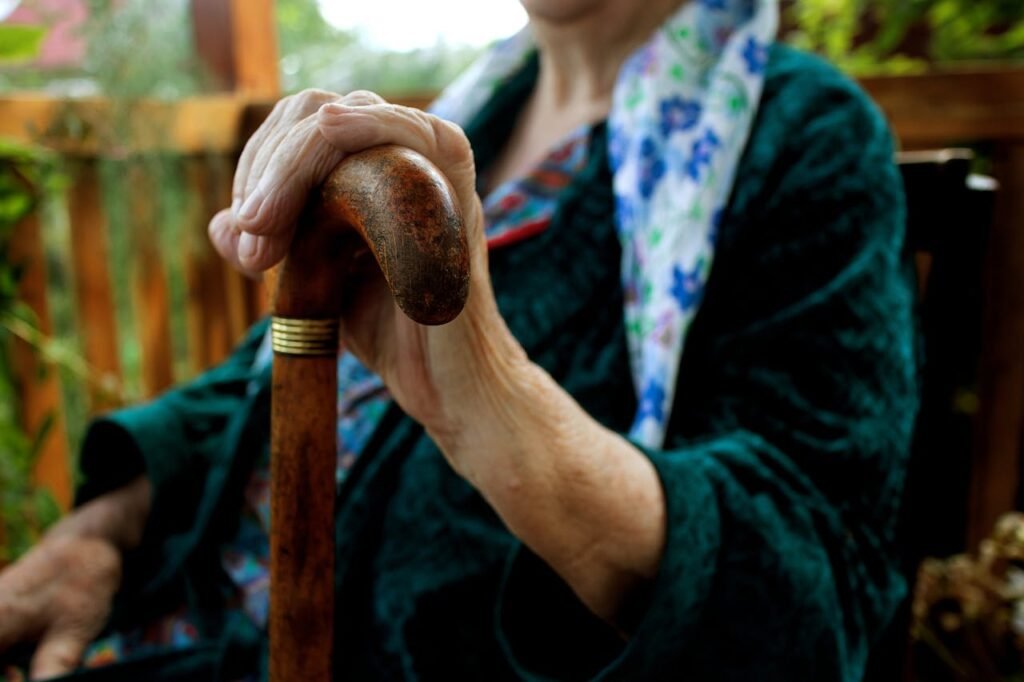
Social hesitation after limb loss often starts quietly. Seniors might feel uncertain about how others will react to their prosthesis or fear being seen as dependent. Some may even avoid gatherings altogether because they don’t want questions or stares.
These feelings are natural, not signs of weakness. A prosthetic limb is a visible part of life, but it doesn’t define who a person is. Understanding that hesitation is the first step toward overcoming it. Once it’s named, it becomes easier to manage.
Reconnecting with People Gradually
Confidence grows in small steps. Instead of diving into big events right away, seniors can start by spending time with close friends or family members who make them feel comfortable.
These smaller interactions help rebuild ease and self-assurance. Each positive experience — a friendly conversation, a smile, a short outing — adds another layer of confidence. Before long, larger social situations feel much less intimidating.
Changing the Inner Conversation
Sometimes, the biggest barrier is not what others think, but what we tell ourselves. Seniors who believe they might look awkward or be judged often project that worry outward, even when others are simply curious or kind.
Replacing those thoughts with affirmations can help: “I am capable.” “My prosthesis gives me strength.” “I can do this.” Over time, these reminders shape how one carries themselves in public — calm, natural, and proud.
Seeing the Prosthesis as a Symbol of Strength
A prosthetic limb represents resilience and adaptability. It’s proof of overcoming challenges, not a limitation. Seeing it that way changes how others see it, too.
When seniors treat their prosthesis as part of who they are — not something to hide — they naturally draw respect and admiration. Confidence doesn’t mean ignoring the prosthesis; it means wearing it with quiet pride.
Joining Social Groups and Communities
Finding the Right Space to Belong
Being part of a group helps replace isolation with belonging. Seniors can explore local support circles, community clubs, or online forums for prosthetic users. These spaces are full of people who understand exactly what they’re going through.
Conversations in these groups often go beyond prosthetics — they cover hobbies, travel, food, and daily life. It’s not just about sharing struggles but sharing joys and laughter, too.
The Power of Shared Experience
When someone hears another person say, “I went through that too,” it builds a bridge of understanding. Sharing experiences reduces shame and fear. It reminds seniors that they’re not alone in learning to adapt or in facing curious questions.
In time, these connections turn into friendships. Some seniors even find themselves helping others — a shift that builds deep confidence and pride.
Joining Activity-Based Groups
Not every group has to be about prosthetics or health. Seniors can join photography clubs, walking groups, book circles, or dance classes — any activity that sparks joy.
The goal isn’t to focus on what’s different, but on what’s shared. Being part of a community around a common interest helps shift attention away from the prosthesis and toward personality and participation.
Attending Support Workshops
Workshops organized by prosthetic centers, hospitals, or community groups can be wonderful confidence builders. They often include skill sessions, mental health talks, and meetups with other users.
These events give seniors both information and inspiration. Seeing others move freely, travel, and live independently reminds them that the journey ahead is full of possibilities.
Attending Events and Gatherings
Preparing Ahead for Comfort
Before going to a social event, it helps to plan ahead. Seniors can think about how long they’ll be standing, whether they’ll need to sit, or what type of shoes or attachments might be most comfortable.
Packing an extra liner, sock, or cleaning wipe can bring peace of mind. Comfort is the foundation of confidence. When the prosthesis feels right, the mind relaxes and the person can focus on enjoying the moment.
Arriving Early to Settle In
Arriving a little earlier than others can make a big difference. It allows time to get comfortable, choose a good seat, and adjust without feeling rushed or watched.
Early arrival also helps reduce anxiety. By the time others join, the senior already feels grounded and at ease in the space.
Handling Questions Gracefully
Sometimes people ask curious or awkward questions about the prosthesis. It’s best to respond with calm and simplicity. A short answer like “It helps me move better” is often enough.
If the question feels too personal, it’s okay to smile and change the subject. People often mean well; they just don’t always know how to express it. Over time, seniors develop their own comfortable ways of responding.
Dressing with Confidence
Clothing can influence how someone feels. Seniors can choose outfits that reflect their personality and make them feel good, whether that’s elegant, casual, or colorful.
Some prefer to keep their prosthesis visible; others feel more confident covering it. There’s no right choice — only what feels right for the individual. Confidence is personal, and comfort should always come first.
Traveling with a Prosthesis
Planning Ahead for Smooth Travel
Traveling with a prosthetic limb is absolutely possible — it just needs a little preparation. Checking airline or train policies in advance saves time and reduces stress.
For flights, seniors can carry a doctor’s note or prosthetist’s letter explaining the device. This helps during security checks. Packing spare liners, batteries (if using a bionic limb), and maintenance tools in the carry-on ensures that essentials stay close.
Staying Comfortable During Long Trips
On long journeys, swelling or tightness can occur, so it helps to move around occasionally, stretch, and loosen straps if needed. Keeping the skin clean and dry also prevents irritation.
Wearing comfortable clothing and avoiding overly tight shoes make travel easier. For air travel, booking an aisle seat provides more room to adjust if needed.
Exploring New Places Confidently
Traveling isn’t just about reaching a destination — it’s about enjoying the journey. Seniors can plan activities that suit their comfort and energy levels, balancing exploration with rest.
It’s natural to feel a little cautious at first, especially in new environments. But every positive travel experience builds confidence. With each successful trip, the world feels a bit more open and welcoming.
Using Technology for Ease
Modern travel apps make life easier. Apps that show accessible routes, nearby rest stops, or medical facilities can bring reassurance.
For seniors using smart bionic devices like the Grippy Bionic Hand, it’s important to carry a charger and learn basic troubleshooting before traveling. Knowing how to manage simple issues adds a sense of control and independence.
Building Confidence Through Public Activities
Participating in Community Events
Joining community events is one of the best ways for seniors with prosthetics to feel reconnected and active. Local fairs, fitness walks, or senior clubs provide relaxed, welcoming spaces to meet new people. These events also remind seniors that their prosthesis is not a limitation—it’s a tool that allows them to take part fully in the world around them.
Attending such gatherings regularly helps build familiarity. Faces become familiar, routines settle in, and soon enough, that nervousness about socializing fades. It’s in these small interactions—sharing a laugh, helping a child at a stall, or talking about a hobby—that confidence grows naturally.
Volunteering and Giving Back
Helping others is a powerful way to build self-esteem. Seniors who volunteer, whether at local charities, schools, or temples, often find renewed purpose. When they shift their focus to giving, they stop thinking about how others see them and start thinking about what they can contribute.
Volunteering also helps people discover that their experiences can inspire others. Many younger prosthetic users feel motivated when they meet older individuals who’ve adapted with grace and resilience. It’s a reminder that confidence is contagious.
Sharing Personal Stories
There’s great power in storytelling. Seniors who share their journey—how they adjusted, what challenges they faced, and how they overcame them—often find that their words comfort others. It can be through small conversations or community talks organized by local prosthetic centers or NGOs.
Talking about the process makes the prosthesis feel like a badge of strength rather than a mark of difference. It shows the world that life after limb loss is full, meaningful, and bright.
Engaging in Light Physical Activities
Movement builds confidence. Activities like yoga, gentle swimming, or tai chi help seniors reconnect with their body and gain better control of their prosthesis. These activities are also social—they often take place in groups, offering another chance to bond with others.
The physical benefits are only part of the story. The emotional lift that comes from feeling capable again is what truly transforms daily life. Confidence in the body leads to confidence in every other part of life.
Maintaining Emotional Balance
Accepting Emotional Ups and Downs
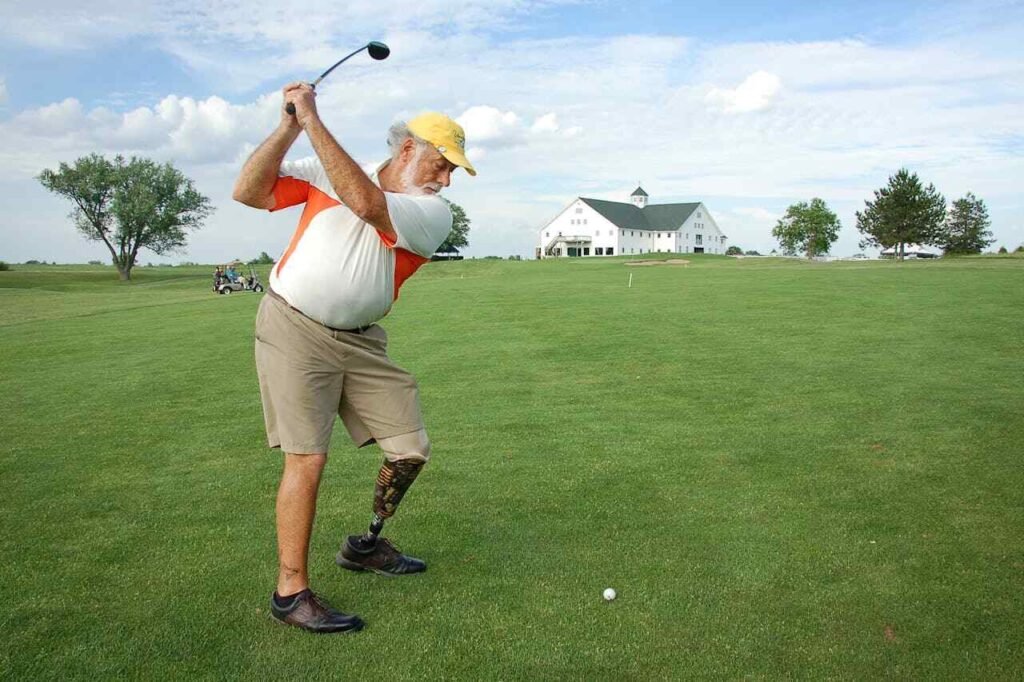
It’s normal for seniors with prosthetics to experience emotional swings. Some days bring energy and joy; others may bring fatigue or frustration. Acknowledging these feelings without judgment is the healthiest approach.
No one feels positive every day, and that’s okay. What matters is staying kind to oneself during the harder moments. Talking to friends, joining a support group, or simply resting helps maintain balance.
Managing Social Anxiety
Social anxiety can appear as nervousness, restlessness, or the urge to avoid gatherings. Seniors can ease this by preparing in small steps—attending short events first, practicing conversation topics, or bringing a trusted friend along.
Breathing exercises and mindfulness can also calm anxiety before entering a social space. A quiet pause, a few deep breaths, or gentle stretching can center the mind before stepping out.
Celebrating Small Wins
Every small step deserves recognition. Attending a family dinner, joining a yoga class, or walking confidently into a new place are all victories. Seniors should take a moment to appreciate these achievements—they’re proof of progress and courage.
Keeping a simple journal of positive experiences helps too. Writing down moments of pride reminds seniors of how far they’ve come, even on days when confidence feels low.
Seeking Professional Support When Needed
Sometimes, emotional distress runs deeper. Feelings of sadness, fear, or loneliness may persist beyond what feels manageable. Talking to a counselor or therapist who understands limb loss can help seniors regain emotional balance.
Mental health is as vital as physical comfort. A well-fitted prosthesis supports movement; a well-supported mind nurtures resilience. Both work together to help seniors thrive socially and emotionally.
Traveling with Social Ease
Traveling in Groups
Group travel is an excellent confidence builder. Being surrounded by familiar faces or like-minded travelers removes the fear of “what if.” It also provides immediate support if any prosthetic adjustment is needed during the trip.
Seniors can look for senior travel clubs or organized group tours that focus on accessibility. Traveling with others creates shared memories, laughter, and reassurance—a perfect recipe for social comfort.
Staying Open to Conversation
Travel naturally sparks curiosity. Locals and fellow travelers might ask about the prosthesis out of genuine interest. Seniors who respond with ease and openness often find these moments turn into friendly conversations.
Sharing simple information can break stereotypes and foster understanding. And sometimes, those small chats lead to unexpected friendships along the journey.
Choosing Accessible Destinations
Confidence grows when the environment feels supportive. Choosing destinations with smooth paths, elevators, and accessible transport ensures that the trip remains enjoyable and stress-free.
Many Indian cities and tourist spots are becoming more accessible every year. With a little research, seniors can find locations that are both beautiful and comfortable to explore.
Balancing Rest and Adventure
Every journey needs balance. It’s important to schedule breaks between activities, especially during long travel days. A little rest helps the body recover and keeps spirits high.
This rhythm of activity and rest makes travel sustainable and pleasurable. Seniors should listen to their bodies and enjoy each moment at their own pace—it’s not about how far they go, but how much joy they find along the way.
Building a Supportive Environment
Family as the Foundation of Confidence
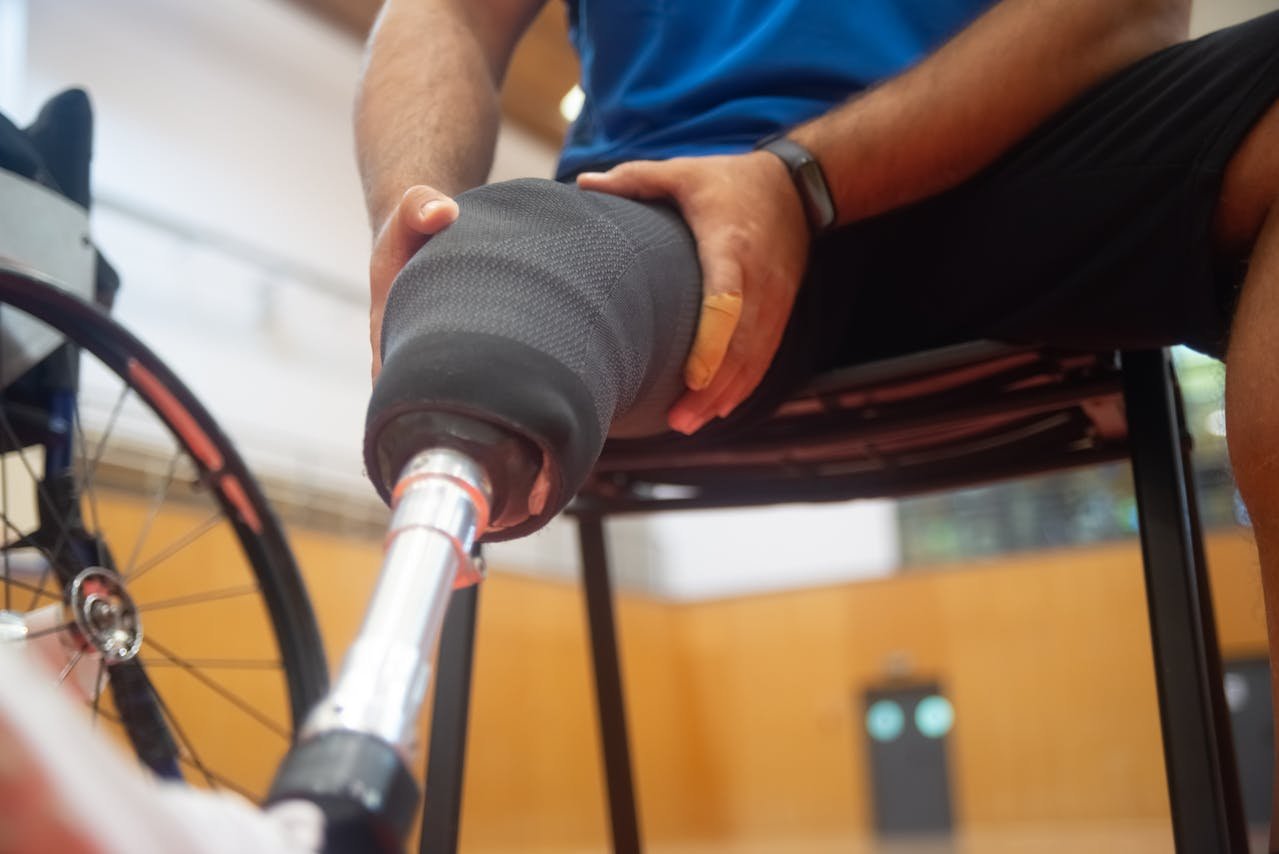
Family members play a huge role in helping seniors feel confident socially. Encouraging words, patience, and understanding make every outing easier. When families treat the prosthesis naturally, it helps seniors feel more at ease around others too.
Including seniors in family plans and letting them take the lead when possible strengthens their sense of independence. Confidence grows naturally when love and respect are part of every interaction.
Creating a Comfortable Home Setup
A safe and well-organized home helps seniors feel secure before stepping out into the world. Easy access to prosthetic maintenance items, comfortable seating, and clutter-free walking spaces build physical confidence.
When home life feels smooth, venturing outside feels less daunting. Confidence starts within familiar walls and expands outward.
Encouraging Peer Connections
Encouragement from peers is powerful. Seniors who regularly meet others with prosthetics—whether online or in person—tend to adapt faster and feel prouder of their progress.
These connections create spaces of understanding, laughter, and shared strength. They also help seniors stay updated on prosthetic care tips, new accessories, and travel ideas.
How Robobionics Helps Seniors Thrive
Technology That Feels Natural
At Robobionics, we design prosthetic limbs that restore not just movement but confidence. Our Sense of Touch™ technology allows users to feel subtle pressure, helping them handle objects more naturally. For seniors, this tactile feedback means they can perform daily tasks with ease and assurance.
Our products like the Grippy Bionic Hand, Grippy Mech Hand, and BrawnBand are built with care, combining innovation with comfort. Each limb is lightweight, user-friendly, and made to adapt to the changing needs of the body.
Accessibility and Affordability for All
We believe everyone deserves access to advanced prosthetics without financial strain. Imported devices often cost over ₹10 lakh, but our Grippy range is priced between ₹2.15–3 lakh, making world-class prosthetics affordable for Indian users.
By manufacturing most components locally, we ensure quick support, easy servicing, and sustainable innovation. Our goal is not just to provide devices but to offer lifelong comfort and companionship through technology.
Community and Emotional Support
Robobionics actively works with rehabilitation centers and local prosthetic clinics across India to organize workshops and meet-ups. These gatherings help seniors learn, share experiences, and regain social confidence together.
We also provide guidance for caregivers, helping families understand the emotional and practical aspects of prosthetic life. When everyone is informed, support becomes effortless and genuine.
Encouraging Independence
Our focus extends beyond mobility. We aim to give seniors the confidence to step out into the world—attend gatherings, travel freely, and live without hesitation.
Each Robobionics device is designed to empower, not restrict. Whether it’s holding a teacup steadily, typing, or joining an evening walk, we ensure that every motion feels natural and liberating.
Living Fully, Confidently, and Proudly
Embracing the New Chapter
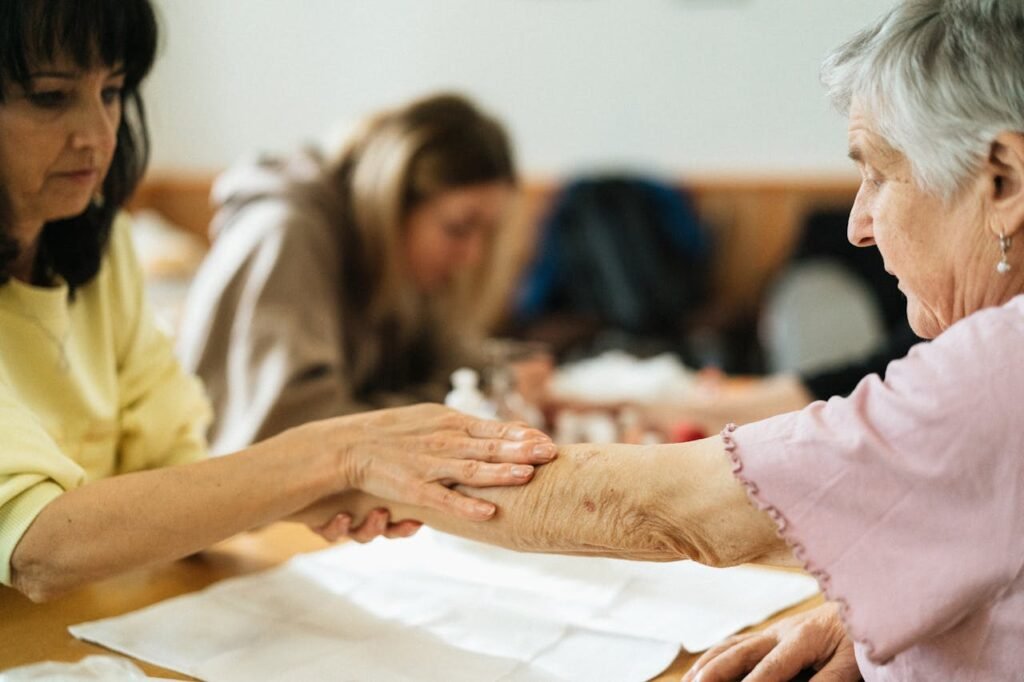
Adapting to a prosthetic limb marks the beginning of a new journey, not the end of an old one. For seniors, this chapter can be filled with travel, social joy, and a renewed sense of purpose.
Confidence doesn’t appear overnight—it grows through small, consistent steps, supportive relationships, and self-kindness. Each day brings another opportunity to live boldly and beautifully.
The Power of Connection
Connection is the heart of social confidence. Whether it’s family, friends, or fellow prosthetic users, relationships bring warmth and encouragement. Every smile shared, every journey taken, strengthens the spirit.
And with the right prosthetic support, the world truly opens up again—inviting seniors to explore, laugh, and live on their own terms.
Taking the First Step with Robobionics
At Robobionics, we walk beside every senior as they rediscover comfort, freedom, and confidence. Our mission is simple: to ensure that technology and care work hand in hand to create independence with dignity.
If you or your loved one is ready to embrace life with renewed confidence, visit www.robobionics.in/bookdemo to schedule a demo or consultation. Let’s make every moment — at home, at events, or across the world — a confident one.



